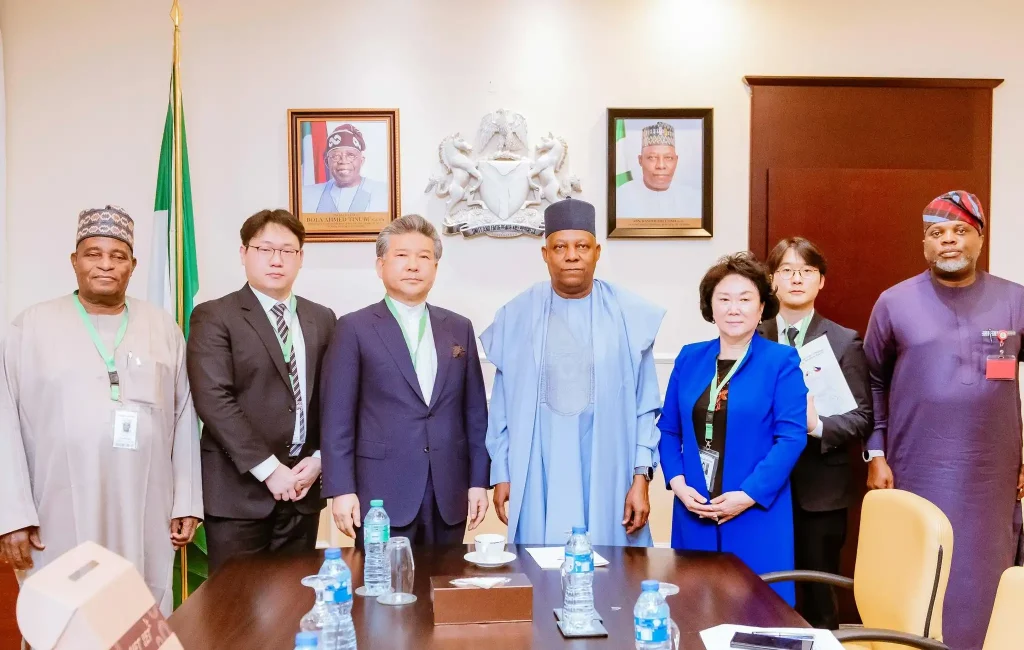South Korea’s Asia Economic Development Committee (AEDC) has put forward a proposal to collaborate with Nigeria in advancing the production of solar equipment and electric vehicles (EVs) in the country.
On Tuesday, during a courtesy visit to the Presidential Villa in Abuja by AEDC Chairman Mr. Yoon Suk-hun and his delegation, Vice President Kashim Shettima expressed strong support for the initiative, according to a report by the News Agency of Nigeria (NAN).
Commitment to Industrial Growth and Technology Transfer
Shettima highlighted the commitment of the Tinubu administration to driving industrial growth and fostering investments that can facilitate technology transfer, ultimately improving the lives of Nigerian citizens. “Vice President Shettima welcomed the proposed partnership between Nigeria and South Korea’s AEDC, focusing on the manufacturing of solar equipment and electric vehicles,” the NAN article stated.
The Vice President reassured the AEDC delegation that Nigeria is open to any arrangement that will enable technology transfer and strengthen the country’s capabilities in solar energy and electric vehicle production.
Expanding Industrialization with a Focus on Clean Energy and Mobility
In his remarks, Shettima stressed that Nigeria is ready to explore partnerships that will accelerate the country’s industrialization efforts, especially within the renewable energy and automotive sectors. He also praised South Korea’s ongoing contributions to Africa’s development, particularly in technology investments and human capital development.
AEDC’s Broader Vision for Digital Security and Technological Advancement
In addition to supporting renewable energy and electric vehicles, the AEDC also proposed backing Nigeria’s security infrastructure by incorporating advanced information technology systems. Shettima acknowledged that such initiatives fit into the administration’s wider goals of enhancing security and creating a business-friendly environment in the country.
Focus on Long-term Growth and Technology Transfer
According to a statement from NAN, Mr. Yoon Suk-hun explained that AEDC’s interest in Nigeria is driven by the country’s vast potential and its forward-thinking leadership. He emphasized that the committee’s proposals are centered around long-term technology transfer and capacity building, rather than short-term profit, with a particular emphasis on solar energy, electric mobility, and digital security.
A Green Future for Nigeria: Building on Clean Energy and Technological Innovation
This proposed collaboration could play a pivotal role in advancing Nigeria’s ambitions for a cleaner, technology-driven energy and transportation sector.
Recently, in March 2025, the Nigerian government unveiled plans to initiate mass electric vehicle transportation in the North-East, following the approval of N151.9 billion in contracts by the Federal Executive Council (FEC). The project, funded by the North East Development Commission (NEDC), will involve the deployment of electric buses and tricycles, along with the installation of charging infrastructure—representing a significant policy shift toward reducing carbon emissions and improving energy efficiency.
Boosting Local Manufacturing and Reducing Import Dependency
If successfully implemented, the partnership with AEDC could significantly bolster Nigeria’s local manufacturing capacity for electric vehicles and solar equipment, reduce reliance on imports, and foster long-term technological advancements in the country’s industrial base.












